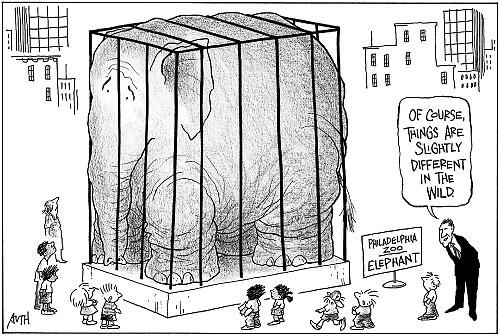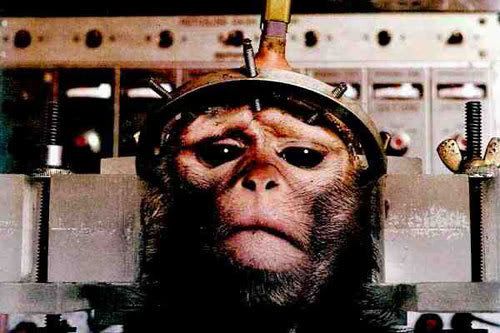"'Come.' Bearing him in his arms like a lamb, he re-enters the surgery. 'I thought you would save him for another week,' says Bev Shaw. 'Are you giving him up?' 'Yes, I am giving him up.'" [1]This passage struck me because I felt like I really understood how the man felt. I've never euthanized an animal or anything near that, but I know what it feels like to have to give up, knowing that there is a solution, but it is completely out of reach. Twice in my life, I have been faced with the decision to put an animal down. Once, on Christmas Eve when I was about 14, I found a kitten shivering at my backdoor. Since it was so cold outside, I let her in and tried to feed her. She was terrible thin and I pleaded with my dad to let us take her to the veterinarian. The vet said that she was so underweight she probably wouldn't stay alive more than a week, and the most humane thing to do would be to put her down. I completely rejected this idea, believing that it was wrong to euthanize animals, and told the vet that I would try to make her healthy again. She died the next night. The second time I was told a vet that I should choose euthanasia was a few years later. A had seen 'neighborhood' (homeless) cat mauled by two dogs, and knew she was going to die soon. I frantically drove her all over the city trying to find someone who would treat her cheaply, being turned down by each one. The last place I tried was right down the street from my house, and the vet calmly told me that treatment would be $2,000, and if I wanted instead to let her go, he would take care of it. Faced with the inevitable, I sat down and cried, in my nightclothes in the middle of the vets office. It was humiliating, but I couldn't help it. I knew that this cat could easily (but expensively) be saved, but it was impossible in this case. At that time, I was sad because I didn't want to let go of a cat that I loved, and so it was basically a selfish reaction. In fact, I believe that a lot of love, and emotional reactions to 'wrong-doing' is selfish, because we are reacting to the way the event makes us feel, and not the actual problem with the event itself. In Disgrace, Lucy says, "So if we are going to be kind, let it be out of simple generosity, not because we feel guilty or fear retribution." [2] I feel that this mirrors the way I feel about kindness: it shouldn't be for the sake of ourselves, but for the sake of kindness to others.
Every week I table for SACA, and nearly every week someone comes by the table and says, 'ooh! I love animals!' They might come to one meeting, but after realizing that our idea of "animal rights" extends far beyond puppies and kittens, they quickly disappear. If someone decides that they want to extend their love to animals, it should be to all animals and not just the animals that benefit them as pets, otherwise it is just more selfishness. Once animals are used to entertain us, that sympathy goes away. As Elizabeth Costello stated, "Once you are on show, you have no private life." [3] Kafka says, "If you go there [to the cage], you're lost." [4]. When animals are used for our pleasure, they become objects, their "body is just the engine shoving it forward." [5]
The two pictures below are at a protest I participated in at the Ringling Circus in Austin over the summer.


 Many parent's see the zoo as a beneficial experience for kids because it lets them see "wild" animals that they wouldn't get to see otherwise. But like the picture above [6] suggests, seeing a captured animal does not give the same experience as seeing a wild animal.
Many parent's see the zoo as a beneficial experience for kids because it lets them see "wild" animals that they wouldn't get to see otherwise. But like the picture above [6] suggests, seeing a captured animal does not give the same experience as seeing a wild animal.I personally believe this is wrong because I love animals, but I am offended when people claim to love animals, but don't take the time or effort to figure out what they really love. Most of the time, it's simply the way animals make them feel. Tomorrow SACA is holding a rally against Puppy Mills, and I'm sure I'll run into one of these people. As hard as it is, I'll try to treat them with respect because I'm glad that they at least care, at some base level.
Boycotting Petland in Austin
Even though I used to see emotions as a weakness, for the past few years I have slowly begun to change my mind. Letting ourselves become emotional is not weak because it is irrational, it is simply scary because it can't be controlled. I believe that logic and reason are essential to a working world, but emotion is the base of happiness. It should never be used as a replacement for reason, but likewise should never be discredited. Although I still consider myself a rational person, I have changed the way I think. When I feel something, I don't focus so much on whether or not the reaction is reasonable, but rather why I feel that way in the first place. For me, it places my thoughts more on the outside world rather on the inside (where I have been for way too long), because I think of what exactly it was that prompted the emotion. This way of thinking has deeply extended my compassion for others, and has really changed the way I feel about animals. I have always considered myself an "animal lover," but instead of being the person who cares about dogs because they make me feel good, I have become the person who cares about all animals because I have founded my beliefs on morality. I feel that there is an essential difference between these two things, and emotion shouldn't always be disqualified. For me, it has contributed to real growth of spirit and mind.
[1]: Animal Humanities Course Packet: "Disgrace," Coetzee, pg. 349
[2]: Animal Humanities Course Packet: "Disgrace," Coetzee, pg. 334
[3]: Elizabeth Costello, 33
[4]: Animal Humanities Course Packet: A Report for an Academy, pg. 324
[5]: Animal Humanities Course Packet: Ted Hughes, a Second Glance at a Jaguar, pg. 331
[6]: http://www.dawnwatch.com/PhillyZooElephant.jpg








